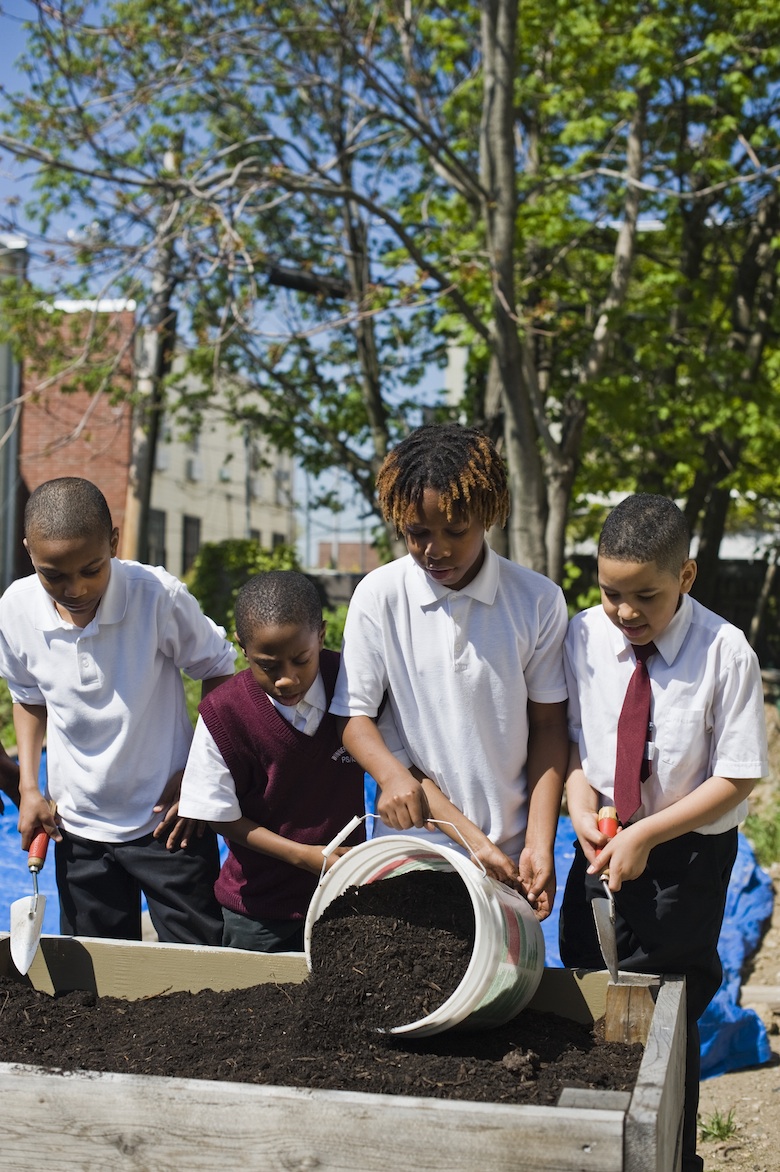
Nora Painten will be the first to tell you she didn’t set out to build a 7,500-square-foot farm in Brownsville for the neighborhood schoolkids, but for herself.
“I wanted to grow food in the city,” recalls Painten, 30, thinning spinach that neighboring PS 323’s students help tend in the tall beds across the street from their classrooms. “It was totally selfish in the beginning.”
But that was three years ago, when she had moved back to Brooklyn after a stint working the land at Connecticut’s White Gate Farm. She was living in Carroll Gardens and cobbling together an urban agriculture career with part-time gigs at places like Brooklyn New School and Ujima Garden, the teaching farm Slow Food NYC runs in East New York.
Biking home through Brownsville—which has the highest concentration of housing projects in the city—she always passed an overgrown vacant parcel on Rockaway Avenue, just across from P.S. 323. Flat, wide and empty for the past 30 years, it got full sun all day long.
In other words, says Painten, it was the perfect place to grow a ton of food.
It turned out that the plot, just north of Sutter Avenue, was owned by the New York City Department of Housing and Preservation, which lets citizens garden on unused properties provided the agency can use the land anytime it needs it. The city’s second requirement, says Painten, is to have 10 neighbors on board to help run a community garden, or to have a working relationship with a nearby school.
With no connections to Brownsville residents, Painten focused on wooing the staff of the elementary school, winning the principal over to a farm’s educational potential with a box of Ujima Garden produce. Not only would an urban farm provide needed green space for the community and “an outdoor classroom,” as Painten puts it, but it could show the students—the vast majority of them African American, West African or Hispanic, growing up in the low-income, insular community—how great fresh spinach can taste, or the beauty of squash blossoms still on the vine.
Painten’s appeal worked. By March of last year she had scored not just approval from the city to launch Brownsville Student Farm but $24,282 through Kickstarter. She used the cash for big-ticket items like renting a jackhammer to help level the land, connecting to the city water supply, buying a shipping container to serve as a secure toolshed and stocking it with rakes, shovels and wheelbarrows.
She also landed donations from organizations that support city gardens. The nonprofit GreenThumb gave tools, wood for beds, seeds, plants and guidance; a group called Groundswell put up a brilliant pink and purple mural on the wall of the neighboring building; and the Department of Sanitation provided small mountains of expensive soil. (While Painten forged all these connections on her own, the nonprofit organization 596acres.org, which Edible Brooklyn featured last summer, helps others through these processes.)
Two of Painten’s old Wesleyan classmates, now architects who founded a sustainable firm called growingCities, helped plan and construct a 20-foot-long winterized chicken coop and 20 extra-deep, extra-long raised beds of reclaimed wood with built-in steps that serve as places to kneel or sit. Designed with children in mind, they criscross the space to create mini-classrooms where Painten lectures on proper garlic planting for tiny fingers during science classes (it’s coming up in clumps, despite her best efforts) or trains eighth graders after school on the art of turning compost.
It’s lessons like those, rather than the produce itself, that Painten is most focused on in the garden’s second season. She worries less about thickly planted garlic or whether the cucumbers could use some rain, and more about planning intensive summer programs for the kids and getting more teachers to work the farm into their curricula. (She also hopes to find funding for a farmer training program and part-time educators who can guide teachers who are reluctant to come when she’s not there.)
While P.S. 323 students sometimes sell produce at a farm stand, and some is bought by a tiny Carroll Gardens restaurant named Take Root, most of it is just given away to neighbors for the asking, says Painten. And that’s just fine: “Once I started doing this, and being with kids,” she says, “I realized it was what had been missing from my farming all along.”
Brownsville Student Farm Project: 522 Rockaway Avenue; 917.620.8333; studentfarmproject.com
Photo credit: Valery Rizzo



